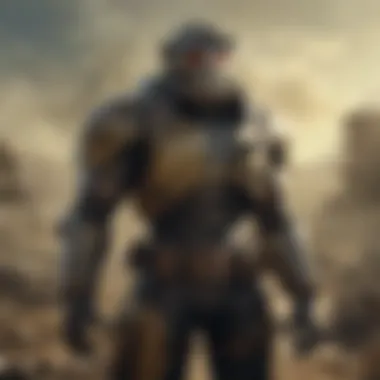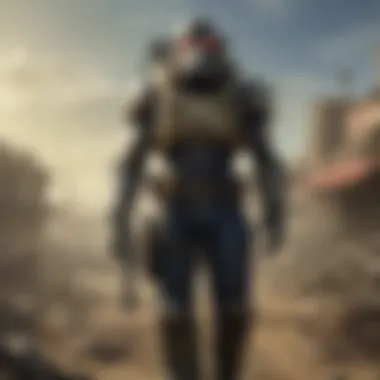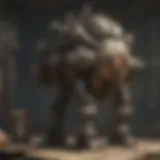Examining the Fallout Series on Nintendo Switch


Intro
The Fallout series presents a compelling universe, meshing post-apocalyptic themes with immersive storytelling and rich gameplay. The transition of this franchise to the Nintendo Switch embodies a notable evolution, adding a layer of portability that appeals to a broader audience. This article aims to explore the distinct characteristics that emerge from the Switch's unique ecosystem and offers an exhaustive guide to its integration with Fallout.
By diving deep into gameplay features, analyzing character development, and unearthing community engagement, we'll unravel how this classic series retains its essence while adapting to the Switch's capabilities. To begin, let’s unfurl the lore that defines this iconic franchise and sets the stage for understanding its impact on players today.
Lore Insights
Overview of the Fallout Universe
The Fallout universe thrives on a narrative steeped in societal collapse and nuclear armageddon. Set in an alternate reality where the Cold War leads to a nuclear fallout, this universe draws from 1950s aesthetics, blending retro-futurism with dystopian themes. The enduring struggle for survival, amidst mutated creatures and war-torn environments, creates a vibrant yet grim backdrop that is as thrilling as it is thought-provoking.
Key Historical Events in the Fallout Timeline
A series of catastrophic events shapes the world of Fallout:
- The Great War: Marking the end of civilization as we know it, this event sparked the series' main lore.
- The Rise of Vaults: These underground shelters become a primary setting, showcasing human behavior under extreme circumstances.
- Societal Reformation: Post-war, factions like the Brotherhood of Steel, the Enclave, and the Railroad emerge, each with their own ideals and goals.
Deep Dive Into the Backstory of Major Factions and Characters
The factions play a pivotal role in Fallout’s narrative:
- Brotherhood of Steel: Founded to preserve technology, yet often seen as authoritarian.
- The Institute: Known for its morally questionable experiments in synthetic life.
- Railroad: Advocating for freedom for synthetic beings, bringing a moral dilemma to the forefront.
Characters such as the Sole Survivor or the Courier serve as avatars for the player's journey, shaping the storyline through choices and alliances.
Gameplay Tips and Strategies
Beginner's Guide to Playing Fallout Games
For those new to Fallout on Switch, starting can feel overwhelming. Here are a few pointers:
- Explore Everything: The world is rich with lore and hidden treasures. Don't rush or shy away from taking detours.
- Dialogue Matters: Pay attention to conversations. Choices impact your story significantly.
Weapon and Armor Recommendations
- Weapons: Opt for classics like the hunting rifle for accuracy or energy weapons for efficiency in certain factions.
- Armor: Power Armor is ideal for heavy battles; in contrast, light armor suits stealth strategies better.
Tips for Efficient Resource Management
Managing resources is crucial:
- Collect scrap materials. They’re essential for crafting.
- Prioritize food and water. Survival depends on these basics.
- Use the Pip-Boy wisely. Track items and health status effectively.
Character Analysis
Detailed Profiles of Iconic Characters
Characters such as Piper Wright and *Ghouls like Nick Valentine bring depth to the experience, showcasing the human condition amid adversity.
Relationships Between Characters in the Fallout Series
Interactions range from camaraderie to betrayal, adding layers to the narrative. The changing dynamics among factions, allies, and foes keep players engaged as they navigate complex moral landscapes.
Character Development and Evolution Across Games
From Fallout 1 to Fallout 4, characters evolve, reflecting the consequences of player choices and the broader impact of the post-apocalyptic world.
"Character relationships define much of the player experience; they influence choices more than sometimes even the storyline itself."
News and Updates
Latest Announcements from Game Developers
Game developers frequently keep the community informed through social media and gaming events. Keeping up with platforms like Reddit or even Facebook can yield valuable insights into upcoming content.
Patch Notes and Upcoming Releases


Stay updated with the latest patch notes to understand enhancements and fixes. DLCs can often introduce new storylines or gameplay mechanics, expanding the universe.
Community Events and Tournaments
Engage with communities through organized events or forums. They often spark discussions about strategies or theories, enriching the player experience.
Fan Theories and Speculations
Popular Fan Theories About the Fallout Universe
Fan speculation adds an exciting layer to the lore. Theories range from connections between factions to explanations for missing characters.
Discussion on Unresolved Plot Points
Unresolved plot strands consistently keep fans theorizing and debating, contributing to a living community atmosphere.
Predictions for Future Installments in the Series
As the franchise progresses, speculation about new features, storylines, or sequels fuels interest. Players often collate their hopes and theories, creating a collaborative narrative experience.
This comprehensive exploration of the Fallout series on Nintendo Switch not only enhances understanding but also connects with fellow enthusiasts, creating an engaging and thought-provoking journey into one of gaming's most beloved franchises.
Prelude to Fallout on Nintendo Switch
Exploring the Fallout series on the Nintendo Switch presents an intriguing intersection of narrative depth, gameplay mechanics, and the uniquely portable format of the Switch. This article delves into the significance of the Fallout franchise's arrival on this platform, a move that not only expands player access but also alters the experience of a series famed for its richly detailed open worlds and complex moral dilemmas. Understanding this transition holds importance for current fans and newcomers alike, as it sheds light on the many layers that make Fallout an enduring favorite in the gaming community.
Overview of the Fallout Series
The Fallout series has carved out a distinguished place in the annals of gaming history, largely due to its post-apocalyptic narratives, compelling characters, and moral quandaries. Originating in 1997, Fallout has evolved significantly, introducing players to dystopian futures where every decision has far-reaching consequences. The franchise melds elements of role-playing games with strategic combat, underpinned by a uniquely dark sense of humor. It's within this complex tapestry that gamers find both challenge and charm, drawing them into expansive wastelands filled with treachery and unexpected alliances.
The series is not merely about survival; it also emphasizes storytelling. Players navigate between factions and characters, each choice painting a different picture of the devastated world. Titles like Fallout 3 and Fallout: New Vegas are often hailed for their innovative approaches to narrative design, yet the series only continues to grow. With various spin-offs and expansions, Fallout has made its mark as a cultural phenomenon, inspiring a loyal fanbase eager for new adventures.
Transitioning to Nintendo Switch
Bringing Fallout to the Nintendo Switch is a noteworthy endeavor. The Switch is known for its versatility, allowing players to easily switch between handheld and docked gameplay. However, adapting a franchise renowned for its depth to this format requires careful consideration. While the Switch may lack the raw power of other consoles, it offers unique opportunities for different forms of immersion. Fallout on Switch presents a chance for players to experience familiar stories and worlds in a fresh way, whether they are sneaking through ruins on a bus ride or hunkered down in their living room.
The transition is about more than just scaling down graphics or adjusting controls. It’s about creating an experience that retains the essence of Fallout while embracing the nuances of the Switch. For instance, the touch controls and gyroscope offer interesting enhancements for gameplay, introducing new layers of interactivity that were previously unavailable. However, these adaptations do come with challenges, including the potential for performance limitations and content modifications that could alter the spirit of the original series. Navigating this complex landscape calls for both creativity and fidelity to the source material.
In summary, the migration of Fallout onto the Nintendo Switch opens up a new frontier for both veterans and fresh faces to explore. As players dive into this condensed version of the sprawling world, they will uncover not just the struggles of survival but also the deeper themes that have kept the franchise alive for decades.
Technical Aspects of Fallout on Switch
When it comes to exploring the depths of the Fallout series on the Nintendo Switch, the technical aspects are paramount. This section aims to shed light on the various technical elements that shape the player experience and how they affect the overall Fallout adventure on this unique platform. By dissecting the graphics, performance, and gameplay mechanics, we can appreciate how the game embraces the Switch’s capabilities while also facing certain limitations.
Graphics and Performance
Graphics play a significant role in creating a compelling game experience. In the case of Fallout titles on Switch, it’s a mixed bag. The game's visuals have seen a notable reduction in fidelity compared to more powerful consoles like the PlayStation 4 or Xbox One. This hasn't gone unnoticed by players, as the charm of the pre-apocalyptic landscapes can feel somewhat muted. Shadows may look less detailed, and texture pop-ins can occur, especially during intense action scenes.
However, looking beyond the pixels, it’s essential to consider the Switch's portability. The visuals may not dazzle, but players can immerse themselves in the post-apocalyptic world virtually anywhere, whether in a cafe or during their daily commute. Optimization efforts by the developers strive to keep things running as smoothly as possible, but frame drops may frustrate those who prioritize high-performance gameplay.
"Portable gaming without compromising too much on experience is a fine line to walk, and Fallout on Switch does its best to balance this precarious setup."
The concept of performance on the Switch also encompasses load times and battery consumption. While navigating the Wasteland, players have noticed some significantly quicker load times than on other consoles. When you’re deep in an engaging story mission or hunting down your next target, experiencing a seamless transition into the action enhances the gameplay.
Gameplay Mechanics Adaptation
Moving beyond mere visuals, gameplay mechanics are where the heart of an RPG, such as Fallout, lies. On the Switch, several adaptations have been implemented to align with the unique features of the console. For starters, control schemes have been carefully adjusted to utilize the Joy-Cons effectively. The gyroscopic controls offer a fresh spin on aiming: players can tilt their controllers for precision aiming, adding a layer of immersion.
Furthermore, the benefit of touch controls gives a new dimension to inventory management. When navigating through menus, players can swipe through items and equipment more efficiently. However, the sensitive nature can sometimes lead to unintentional selections—a small headache for users accustomed to more conventional setups.
The Switch also offers local co-op play for certain titles, which can bring an intriguing dynamic to the traditional Fallout experience. Engaging a friend in scavenging missions or collaborative quests can make for unforgettable moments, making it a more social experience than other iterations. Yet, it’s worth noting that some might find this adaptation less polished when compared to single-player intensity.
In summary, the technical characteristics encapsulating Fallout on the Nintendo Switch highlight a delicate balancing act. From managing graphical fidelity to adapting core gameplay mechanics, players get to enjoy Fallout's hallmark storytelling, albeit with some limitations. Harnessing the unique features of the Switch is no small task, but when executed well, it can foster innovative experiences.
Ultimately, understanding these technical aspects enriches the player's interaction with the title, making it all the more worthwhile to explore the Fallout universe in this versatile environment.
Noteworthy Titles Available
Examining the Noteworthy Titles available on Nintendo Switch is crucial for understanding how the Fallout series adapts to this platform. Each title brings its own flair, offering unique gameplay elements and a somewhat different experience compared to other systems. The titles play a pivotal role in shaping user expectations and experiences, showcasing what the series has to offer while addressing the limitations and challenges that come with adapting to the Switch.


Fallout Shelter: A Companion Experience
Fallout Shelter stands out in the Fallout lineup on the Switch as an innovative spin-off that emphasizes resource management and strategy over traditional combat and exploration. Its introduction to the Switch was a welcome surprise for many fans, given its accessibility and engaging mechanics.
In this game, you step into the shoes of the Overseer, tasked with constructing and managing a vault for the survivors of the apocalypse. Players collect resources, keep dwellers happy, and fend off threats, all while expanding their underground habitat. This unique format may seem like light fare in contrast to the sprawling narratives of mainline titles, yet it's a superb diversion. More importantly, Fallout Shelter is a complementary experience that broadens the scope of the overall franchise.
Players can enjoy it in short bursts—perfect for the Switch’s portable nature. The touchscreen interface makes it easy to navigate and manage resources, allowing for immediate play that can fit into a busy schedule.
Benefits of Fallout Shelter on Switch:
- Portability: Accessible anytime, anywhere, making it easy for players to dip in and out of the game.
- Touchscreen Controls: The interface is designed for intuitive touch interaction, enhancing user experience.
- Quick Gameplay: Ideal for those who want a Fallout fix but are short on time.
"Fallout Shelter on the Switch breaks the mold for traditional gameplay, providing a fresh perspective while remaining faithful to its roots."
The Fallout Controversy
Fallout 76 is perhaps one of the most talked-about titles in the Fallout franchise, with a launch that sparked considerable debate among gamers. Initially released for other platforms, its eventual arrival on the Nintendo Switch has not been without its challenges. This game attempts to deliver an online experience set in a post-apocalyptic world filled with players, quests, and environmental storytelling, marking a drastic shift from the single-player nature of previous entries.
However, this transition has been riddled with issues. Player feedback often points to the game’s initial technical difficulties, such as bugs and performance hiccups, which were exacerbated on the Switch. The hardware of the Switch, while magical in its own right, represents a different realm compared to more powerful gaming consoles. Hence, players have faced limitations regarding graphics and general gameplay fluidity.
Moreover, the community response has been a mixed bag. While some enjoy the concept of a shared universe, others miss the depth and narrative richness previously offered. This disparity emphasizes a fundamental question about the future direction of the franchise.
Key considerations regarding Fallout 76 include:
- Performance Issues: Frequent crashes and lag, especially noted by those familiar with smoother experiences on other consoles.
- Gameplay Dynamics: Need for players to adapt to live service models, enhancing some elements while detracting from traditional storytelling.
- Community Division: Players remain polarized; some embrace the new direction, while others call for a return to roots.
Understanding these titles allows fans to grasp how the Fallout series has been molded on the Switch. As community feedback continues to evolve, it’s essential to stay tuned to these changes, for they not only influence gameplay but also the future of the franchise itself.
Community Reception and Feedback
The reception of a game series like Fallout on a platform like Nintendo Switch offers a fascinating glimpse into how gaming communities adapt and evolve. Community feedback provides valuable insights into the players’ experiences, preferences, and the broader dialogue surrounding the franchise. This section explores noteworthy elements of fan discussions and how the Fallout series compares to its counterparts on other platforms.
Fan Discussions and Forums
Fan discussions play a pivotal role in shaping the small universe surrounding any successful series. Platforms such as Reddit and various gaming forums serve as hotbeds for debates and opinions about Fallout on the Nintendo Switch. Players often share their thoughts about the storytelling, characters, and gameplay mechanics.
Many fans praise how the series adapts to the Switch’s unique controls and portability, allowing for spontaneous gameplay sessions. Others are vocal about their grievances, especially regarding performance issues. Some users, for example, have pointed out frame rate drops in crowded scenes, which detracts from the immersive experience. The discussions highlight that communication within these communities fosters a space for improvement and innovation.
Moreover, the emotional attachments formed through shared experiences significantly influence how the community perceives the series on this platform. Discussions reveal a mix of nostalgia for classic Fallout titles alongside anticipation for what future developments lie ahead. This blend of past and future creates a rich tapestry of opinions that informs not just the player base but the developers as well.
"The best part of playing Fallout as a community is that you never play alone; you’re always part of something larger."
Comparative Analysis with Other Platforms
When placed under the microscope, comparing Fallout on the Nintendo Switch with experiences on platforms like PlayStation or Xbox reveals stark contrasts. Those playing on higher-spec systems often highlight the graphical superiority and performance enhancements that can lead to more immersive experiences. This disparity prompts discussions about how technical limitations may alter gameplay on the Switch, making some players feel like they’re missing out.
Interestingly, this doesn’t always translate to a negative outlook. For some, the convenience and flexibility of the Switch outweigh the graphical fidelity of other consoles. Players often mention how being able to play on the go can add a layer of enjoyment to the series. The choice between quality and accessibility is a recurring theme in community discussions.
A few common points of comparison often discussed include:
- Graphics Quality: Many players note the stark differences in visuals compared to high-end consoles, prompting a mix of admiration for the handheld capabilities and disappointment for the reduced graphic fidelity.
- Gameplay Experience: The mechanics may feel somewhat adapted or simplified on the Switch, leading to mixed reactions, especially from long-time fans accustomed to the detailed control schemes on other systems.
- Community Engagement: There’s a sense of camaraderie in being part of a portable gaming community, where players can easily meet and discuss, creating a different form of interaction compared to the console-dominated forums.
Through these discussions, it becomes clear that while there are notable challenges, the community's reception on the Nintendo Switch remains largely positive, driven by a blend of nostalgia, accessibility, and the unique charm of the platform.
Unique Features on Nintendo Switch
The Nintendo Switch has carved a niche for itself in the gaming world, largely due to its unique features that differentiate it from other gaming consoles. As Fallout fans migrate to this platform, it's vital to understand how these elements reshape the gaming experience for this iconic franchise. This section will delve into two of the standout features—portability and Joy-Con integration—that collectively enhance how players interact with the Fallout series.
Portability and Ease of Access
One of the most significant advantages of the Nintendo Switch is undoubtedly its portability. The console’s hybrid design allows players to switch seamlessly between handheld and docked modes, enabling them to dive into the post-apocalyptic landscapes of Fallout wherever they are. This feature resonates particularly well with gamers who appreciate the idea of embarking on quests during commutes or while on a lunch break. Imagine picking up right where you left off in Fallout Shelter while waiting for that bus to arrive.
Moreover, this ease of access comes with its own set of benefits. The ability to take your gameplay on the go cultivates a more immersive experience, encouraging longer play sessions without the confines of being tethered to a television screen. This also has implications for how narrative unfolds; players can find themselves deeply enmeshed in the Fallout universe in various contexts, making storytelling even more engaging.
"With the Switch in hand, the Wasteland isn’t just a destination, it’s a companion on your adventures."
In the flexible world of the Switch, gameplay becomes more spontaneous. Whether you decide to raid a nearby vault or simply gather resources to improve your settlement, the game is now a thought away. It's this accessibility that allows the franchise to reach a broader audience, as casual gamers and die-hard fans alike can experience Fallout in a format that suits their lives.
Joy-Con Integration for Enhanced Gameplay


The Joy-Con controllers of the Nintendo Switch introduce an innovative way to experience gameplay that no other console matches. Their versatility not only supports traditional controls but also offers motion controls, enhancing interaction within the game environments. Think about how thrilling it can be to physically aim your weapon with intuitive precision against raiders in Fallout.
The Joy-Con's design and functionality encourage cooperative gaming as well, ideal for titles that allow multiplayer systems. For instance, Fallout can be complex and heavy on single-player narrative, but bringing in a friend for a local two-player experience makes it more lively. Players can strategize together, exploring vast environments, searching for loot, or dealing with the ever-looming threat of feral ghouls in tandem.
In practical terms, using the Joy-Con’s HD Rumble feature can enhance environmental immersion. The sensation of a blaring alarm, combined with the tactile feedback of your actions in-game, creates a more three-dimensional experience. This integration of physicality in gameplay enhances storytelling, letting players feel the weight of a decision—not just through narrative but through their controllers.
To sum it up, the unique features of the Nintendo Switch create a distinct atmosphere for Fallout enthusiasts. The combination of portability and the innovative Joy-Con controls successfully transforms the way fans experience the franchise, making it more accessible and interactive than ever.
Challenges Faced by Fallout on Nintendo Switch
Navigating the rugged wastelands of a post-apocalyptic world on the Nintendo Switch comes with its own set of hurdles. The challenges faced by the Fallout series on this platform are significant, showcasing the struggle between maintaining the essence of the game while adapting to the technical limitations inherent in the Switch's design.
Addressing these challenges is crucial, not only for developers but also for players who are keen on experiencing Fallout in all its glory. It raises important questions about the balance between innovation and fidelity to the original games, which have captivated audiences for decades.
A well-rounded understanding of these challenges helps fans grasp the complexities of translating such a rich franchise onto a different console. It enables a deeper appreciation of both the technical feats accomplished and the aspects that may leave players wanting for more.
Performance Limitations
When it comes to performance, the Nintendo Switch does not pack as powerful of a punch as other gaming consoles or PCs. The Fallout games, which are known for their sprawling open worlds and complex gameplay, encounter limitations that are hard to ignore.
Players often notice frame rate drops during intense action sequences or when roaming through densely populated environments. The beauty of the Fallout series lies in its intricate settings, but the Switch's hardware struggles to keep up. For instance, textures may appear less detailed or load slower compared to versions on more robust platforms like PlayStation or Xbox.
Moreover, some environments, particularly in Fallout 76, may have a stripped-down feel due to limitations in graphical fidelity. This can detract from the immersion that fans expect from the series.
Players juggling the two worlds of technicality and gameplay sometimes find that even minor bugs or glitches can interrupt the flow, impacting the overall experience. Adjustments in design and optimization have been made, but it's a balancing act.
"The essence of a rich narrative could sometimes feel stilted in execution when performance falters."
Content Restrictions and Adaptations
Another layer of complexity arises from content restrictions and necessary adaptations unique to the Nintendo Switch. The portable nature of the console means that certain content must be tailored to fit the device’s capabilities and audience. While the Fallout franchise revels in open-world grandeur and often mature themes, there are limitations in handling such content on the Switch.
This tailoring has led to alterations in in-game content, especially with respect to violence, themes, and even language. For instance, dialogue options may be cleaned up to suit a broader audience. The adjustments might streamline experiences, but purists may feel that some of the edge and nuance of the original narratives are compromised.
Furthermore, the integration of controls with Joy-Con presents another challenge. Gameplay mechanics initially designed for traditional consoles require rethinking for optimal usability on the Switch. The adaptation may lead to a simpler interface, which some players find less engaging.
The developers have tried to make the transitions smooth, yet it’s an ongoing process where compromises often become necessary. Fractions of the original content might be lost in adaptation, which can lead to disappointment among dedicated fans. In summary, while the Switch presents an exciting opportunity to play Fallout on the go, the adjustments made in support of its framework can feel like a double-edged sword.
The Future of Fallout on Switch
When considering the longevity and evolution of the Fallout series on the Nintendo Switch, it’s significant to address the potential pathways that lie ahead. The peculiar blend of immersive storytelling, expansive environments, and the unique aesthetics of the Fallout universe can thrive remarkably on this platform. This exploration into the future serves not just as a hopeful glance, but rather as a necessary reflection for fans who are eager to see how a classic franchise adapts over time.
Upcoming Releases and Expectations
Looking ahead, players are buzzing with anticipation regarding new releases tailored for the Switch. While nothing is set in stone, rumblings and discussions among the fan community suggest the possibility of Fallout 5 or perhaps even remastered versions of classic titles like Fallout 3 or New Vegas.
- Fan Expectations: Players hope that these releases remain true to the original feel of the series while also benefiting from the unique features of the Switch. This includes optimized controls, graphical enhancements, and perhaps, immersive gameplay that takes full advantage of the console’s capabilities.
- Market Dynamics: It’s also essential to consider how the Switch's growing popularity may influence Bethesda's decisions. With increasing numbers of Switch users, there’s a palpable reason for developers to engage this audience by rolling out more content.
"The anticipation among the community keeps the spirit alive; fans’ passion can shape the future of Fallout on the Switch.
Potential Developments Within the Franchise
The potential future developments within the Fallout franchise on the Switch could lead to fascinating and innovative gameplay experiences. Two key areas to look out for include:
- Enhanced Multiplayer Features: Given the success of Fallout 76, there’s a chance the franchise might pivot towards creating shared worlds that allow players to experience a communal wasteland, all on the go. The integration of online features could create dynamic play experiences unique to the Switch.
- Expansion of Storylines and Content: The narrative depth that fans love could continue to expand beyond what has come before. It wouldn’t be out of the realm of possibility for developers to explore sequels or spin-offs that capitalize on the Switch's portability. Imagine playing episodic content during short travel breaks that could unfold in the familiar, yet immersive lore of Fallout.
As we look upon the horizon, it’s clear that the Fallout series holds considerable promise for Nintendo Switch. Its ability to adapt and evolve will determine whether it can capture the hearts of both long-time fans and newcomers. With players at the core of these decisions, the future remains bright for the time being.
Epilogue
The exploration of the Fallout series on Nintendo Switch represents a significant chapter in the franchise's journey. This section lays emphasis on how the series adapts to and embraces the unique characteristics of the Switch platform. From portability to innovative gameplay mechanics, the Switch brings its own flavor to the post-apocalyptic universe of Fallout.
Summation of Key Points
Reflecting on our previous sections, several key points come to light:
- Graphical Adaptation: While the Switch may not boast the graphical fidelity of more powerful consoles, it offers a play experience that, in many ways, successfully captures the essence of Fallout.
- Portability: The ability to play Fallout on the go allows for a more flexible gaming experience, appealing particularly to those who appreciate short gaming sessions.
- Community Engagement: The conversations around Fallout within the Nintendo Switch community are vibrant and critical. Fans share tips, experiences, and mod discussions, enhancing the overall experience.
- Performance Challenges: Limitations in frame rates or load times can affect immersion, yet many players still find value in the content offered on this console.
The cumulative insights gathered point towards a balanced understanding of how Fallout interacts with the Nintendo Switch ecosystem.
Final Thoughts on Fallout's Evolution
The evolution of Fallout—from its humble beginnings to vast open worlds—demonstrates adaptability and innovation. With the advent of the Nintendo Switch, the franchise embraces new possibilities and challenges. The Switch may not simultaneously match the technical prowess of its rivals, but it carves its niche in the gaming landscape.
For players, this adaptation underscores a critical evolution; the games remain accessible, inviting both new players and stalwarts alike to engage with familiar faces and narratives. The integration of the Fallout series into the Switch not only broadens its audience but also enhances its cultural relevance in the gaming community. The ongoing discussions amongst fans testify to this, highlighting a vibrant landscape where nostalgia meets innovative gameplay.







